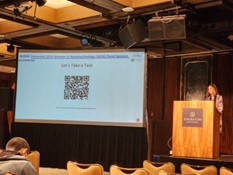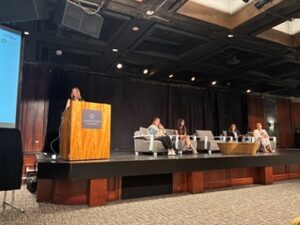 IEEE Nanomed 2024 Women in Nanotechnology (WIN) panel session was held on December 5, 2024. The panel was organized by Olga Boric-Lubecke from University of Hawaii at Manoa, with the panelists Kremena Makasheva from CNRS and University of Toulouse, France, Shue Wang from University of New Haven, and Sara Mahshid and Maryam Tabrizian from McGill University, Canada. The event goals were to increase the visibility of distinguished women researchers, raise awareness of diversity importance, and inspire young female students. In addition to promoting this event through IEEE Nanomed 2024 publicity, it was also publicized by the IEEE WIN Committee chair, Noushin Nasiri, from Maquarie University in Australia. The panel was well attended, with about 50 participants, more than 50% male, at various career stages, from students to senior professionals, such as department chairs and IEEE elected officials from the Nanotechnology Council, namely the IEEE NTC President Jin-Woo Kim.
IEEE Nanomed 2024 Women in Nanotechnology (WIN) panel session was held on December 5, 2024. The panel was organized by Olga Boric-Lubecke from University of Hawaii at Manoa, with the panelists Kremena Makasheva from CNRS and University of Toulouse, France, Shue Wang from University of New Haven, and Sara Mahshid and Maryam Tabrizian from McGill University, Canada. The event goals were to increase the visibility of distinguished women researchers, raise awareness of diversity importance, and inspire young female students. In addition to promoting this event through IEEE Nanomed 2024 publicity, it was also publicized by the IEEE WIN Committee chair, Noushin Nasiri, from Maquarie University in Australia. The panel was well attended, with about 50 participants, more than 50% male, at various career stages, from students to senior professionals, such as department chairs and IEEE elected officials from the Nanotechnology Council, namely the IEEE NTC President Jin-Woo Kim.
 The focus of the panel was importance of gender balance, and broader diversity, equity and inclusion (DEI) in engineering. Olga Boric-Lubecke opened the panel by asking the audience to take a gender-science implicit bias test offered online by Project Implicit: https://implicit.harvard.edu/implicit/takeatest.html, then shared a presentation on DEI importance and challenges, followed by the panel discussion. Kremena Makasheva, Vice-President for Conferences of IEEE Nanotechnology Council opened the discussion with a topic of leadership, with the goal of inclusion of women in organizing committees, in the organization decision bodies, and in volunteer work to improve representation. Shue Wang discussed the key challenges women face in academia regarding gender biases and workplace climate, and raised the question of how can institutions foster an inclusive environment that supports equitable career advancement. Sara Mahshid invited the audience to reflect on and discuss the biases women faculty face during promotion and tenure and what actions can we, as individuals and institutions, take to address and mitigate these challenges. Maryam Tabrizian shared her insights on how she chooses her trainees and manages the cultural diversity in her research group. The panel continued with an engaged Q&A session with the audience, where diverse audience members shared their experiences and voiced their support for DEI.
The focus of the panel was importance of gender balance, and broader diversity, equity and inclusion (DEI) in engineering. Olga Boric-Lubecke opened the panel by asking the audience to take a gender-science implicit bias test offered online by Project Implicit: https://implicit.harvard.edu/implicit/takeatest.html, then shared a presentation on DEI importance and challenges, followed by the panel discussion. Kremena Makasheva, Vice-President for Conferences of IEEE Nanotechnology Council opened the discussion with a topic of leadership, with the goal of inclusion of women in organizing committees, in the organization decision bodies, and in volunteer work to improve representation. Shue Wang discussed the key challenges women face in academia regarding gender biases and workplace climate, and raised the question of how can institutions foster an inclusive environment that supports equitable career advancement. Sara Mahshid invited the audience to reflect on and discuss the biases women faculty face during promotion and tenure and what actions can we, as individuals and institutions, take to address and mitigate these challenges. Maryam Tabrizian shared her insights on how she chooses her trainees and manages the cultural diversity in her research group. The panel continued with an engaged Q&A session with the audience, where diverse audience members shared their experiences and voiced their support for DEI.
